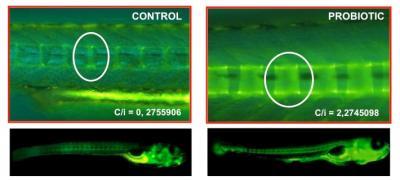Probiotics are the miracle product of the decade because of the belief they can help cultivate “intestinal flora”, whatever that is supposed to mean. It's a $32 billion industry by 2014 but there is one species that scientists can confirm have a benefit - zebrafish.
The Institute of Marine and Environmental Technology found that feeding probiotics to baby zebrafish accelerated their development and increased their chances of survival into adulthood.
Zebrafish are often used in genetic research because they grow quickly and scientists can easily track changes in their development. They also share many of the same genes as humans and can be used for studying cellular and physiological processes and their impact on human disease.
In the zebrafish experiment, researchers added Lactobacillus rhamnosus, a probiotic strain sometimes used in yogurt, to the zebrafish water. The fish drank the probiotic through their gills, and it landed in their gastrointestinal tract, preventing bad bacteria from taking over and promoting growth, including advancing the development of bone, vertebrae, and gonads.
Probiotics helped the zebrafish get through the touch-and-go time when their gastrointestinal tract is maturing. They are still living off yolk with which they are born, and it is during this weaning period when most mortality occurs. Adding probiotics to the water increases the survival rate of zebra fish larvae from 70% to 90%.

A new study finds that feeding probiotics, like those found in yogurt, to zebrafish accelerated the development of their vertebrae and increased their chances of survival into adulthood. Credit: Institute of Marine&Environmental Technology, Baltimore, Maryland.
"If you have increased growth and survival from each batch of hundreds of thousands of eggs, that is a huge benefit," said study co-author Dr. Allen Place of the Institute of Marine and Environmental Technology.
Probiotics helped the zebrafish get through the touch-and-go time when their gastrointestinal tract is maturing. They are still living off yolk with which they are born, and it is during this weaning period when most mortality occurs. Adding probiotics to the water increases the survival rate of zebra fish larvae from 70% to 90%.
"We did not anticipate the enhancement in maturation," said Place. "When you look at various molecular markers of stress, the overall stress in the fish that were treated with the probiotic were lower--which may be the reason for the development."
"This is really exciting," said Jacques Ravel, a leading genomic scientist studying the role of the human microbiome in health and disease at the University of Maryland School of Medicine Institute for Genome Sciences. "Knowing you can colonize the gut of a zebrafish with a probiotic strain and improve its development becomes an interesting model for us to study the beneficial effect of probiotics in children and adults." He and his colleagues are currently looking into the effect of Lactobacillus rhamnosus probiotics on the gut development of premature infants.




Comments